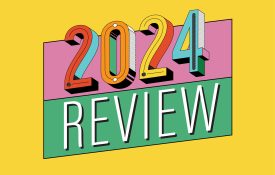-
Learning As an Adult Can Be Hard. It’s Even Harder on a Balance Beam.
Learning a new skill as an adult can be daunting, especially something as difficult as gymnastics. One adult gymnastics class shows there are serious benefits to adult learning. ... Rachel Wu is an associate professor of psychology at University of California, Riverside. She studies the way children learn and how those patterns might help adults learn too. She says that in some ways, learning is easier as an adult. Adults generally grasp concepts more quickly. They're less distracted, and they have better motor control than kids. But learning as an adult requires time, money and quality teachers, which can all be harder to find.
-
How to Get a Party Buzz Even When You’re Not Drinking
It doesn’t matter why you’ve chosen not to drink this holiday season: Your reasons are your own, and they are good enough. But regardless of whether you are sober year-round or you’re just giving yourself a break in December, you are likely facing a series of festive occasions that test your will to make merry with nothing but your unadulterated personality and an ugly sweater. Scrooge may have faced three spirits, but none of them were the Ghost of Christmas Small Talk. To avoid the awkwardness, you might be tempted to just stay in.
-

A Year in Review: Announcing the Top Research From APS’s Journals
The most downloaded psychological science research published in APS’s six peer-reviewed research journals in 2024 cover a broad range of topics about our understanding of ourselves and others.
-
Waiting for a Test Result Can Be Brutal. Here’s How to Deal.
... Simply trying to zone out is particularly ineffective when you’re waiting for significant news, said Kate Sweeny, a professor of psychology at the University of California, Riverside, who studies the difficulty of waiting. So as much as the TV might call out to you when you’re desperate to be distracted, it’s probably not going to help. “Spacing out, listening to music, just trying to relax — those sorts of things are tough,” Dr. Sweeny said. “If they work for you, great. But I would say that for many of us, our minds are perfectly capable of loudly worrying while watching television, while we’re listening to music, while we’re driving the car.”
-

Heart Rates and Step Counts: A Novel Approach to Eating Disorder Care
What potential do everyday devices, like smartwatches, have in transforming the management and treatment of eating disorders? In this episode, Under the Cortex explores how commonly used technology, such as heart rate monitors and step
-
A Winning Mix: High Standards, High Support
When Emma Hayes, the U.S. women’s national soccer team coach, kept the starters in the lineup over a grueling stretch of successive 90-minute Olympic soccer games in France, murmurs rose that the team was on its way to an exit, ousted by exhaustion. ... How we perceive discomfort and negative emotions affects our experience of them. Emotions, whether pleasant or unpleasant, typically last seconds to minutes, says Emily Willroth, an assistant professor of psychological and brain sciences at Washington University in St. Louis.

